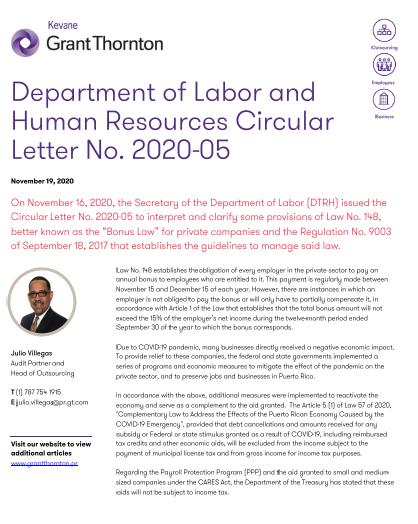Law No. 148 establishes the obligation of every employer in the private sector to pay an annual bonus to employees who are entitled to it. This payment is regularly made between November 15 and December 15 of each year. However, there are instances in which an employer is not obliged to pay the bonus or will only have to partially compensate it, in accordance with Article 1 of the Law that establishes that the total bonus amount will not exceed the 15% of the employer’s net income during the twelve-month period ended September 30 of the year to which the bonus corresponds.
Due to COVID-19 pandemic, many businesses directly received a negative economic impact. To provide relief to these companies, the federal and state governments implemented a series of programs and economic measures to mitigate the effect of the pandemic on the private sector, and to preserve jobs and businesses in Puerto Rico.
In accordance with the above, additional measures were implemented to reactivate the economy and serve as a complement to the aid granted. The Article 5 (1) of Law 57 of 2020, "Complementary Law to Address the Effects of the Puerto Rican Economy Caused by the COVID-19 Emergency", provided that debt cancellations and amounts received for any subsidy or Federal or state stimulus granted as a result of COVID-19, including reimbursed tax credits and other economic aids, will be excluded from the income subject to the payment of municipal license tax and from gross income for income tax purposes.
Regarding the Payroll Protection Program (PPP) and the aid granted to small and medium-sized companies under the CARES Act, the Department of the Treasury has stated that these aids will not be subject to income tax.
Given the current state of law, the DTRH clarifies how will be the treatment of these economic aids received during the pandemic with the evaluation of the financial statements that employers must present for the exemption of the bonus payment. This interpretation establishes that the economic incentives that have been granted to alleviate the effects of the pandemic, debt cancellations and amounts received from any federal or state subsidy or stimulus granted as a result of COVID-19, including reimbursed tax credits and other economic aid, by themselves; will not be considered as income for purposes of the definition of "net profit" in the exemption of the bonus required according to Law 148. Likewise, employers may claim as a deduction from net income, the ordinary and necessary expenses incurred in the operation of the business, even when they have been paid with funds received from any federal or state subsidy. However, if these government aids were used to alleviate any extraordinary loss, this must be stated in the financial statements that are presented to the DTRH. That is, for purposes of bonus exemption, the employer may not claim as loss or extraordinary loss those that were paid with funds received from any federal or state subsidy.
The employers have until Monday, November 30, 2020, to send by regular mail, the original documents needed for the request of exemption of bonus payment.
This Circular Letter is limited to the power of the Secretary of Labor to interpret the provisions of Law No. 148 and applies only to the administrative processes in the DTRH for the evaluation of requests for exemption of the bonus required by law. Therefore, it does not affect in any way the interpretation and jurisdiction of other agencies regarding financial and tax matters under any other state or federal law.
Links
Contact our Outsourcing department should you need help with this or any other accounting matter. At Kevane Grant Thornton we provide our clients with personalized attention, valuable advice and recommendations, tailored solutions, and direct access to technical experts to help clients resolve issues and identify opportunities.

